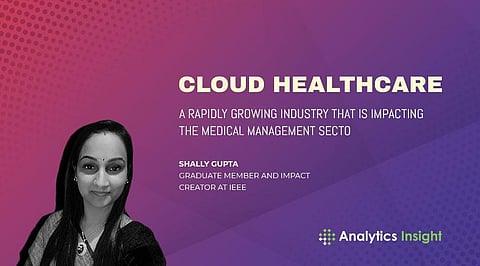

Technology has been a major enabler of growth in the healthcare sector – whether operating expenses (including data storage costs) or addressing the challenges of building a self-sufficient health ecosystem. Along with other innovative technologies such as AI and robots, cloud computing has emerged as one of the most significant disruptors in the industry, improving openness and interoperability across the board.
Given the industry's size and complexity of the sector, cloud computing has proven to be handy – as it helps manage the volume of private and sensitive data and necessitates secure storage. Since the introduction of the Electronic Medical Records (EMR), healthcare companies all around the globe have implemented cloud-based healthcare solutions as a means of storing and securing patient records.
The implementation of cloud computing in the healthcare industry has increased efficiency while decreasing costs. One of the most significant benefits of cloud computing is its ability to simplify sharing medical records and even create and maintain telehealth apps. The enormous benefits of cloud computing have prompted many businesses to incorporate it into their daily operations.
In its most basic form, cloud-based healthcare refers to the incorporation of cloud computing technologies into healthcare services. It allows providers to store digital documents remotely, eliminating the need for them to maintain vast disc warehouses.
An exponentially growing application, such as electronic health records, can experience capacity problems when operated in a traditional environment. If a software application grows faster than the organization's own servers can handle, hosting that application in a cloud computing environment rather than installing more servers can make it easier to handle further expansion. Cloud computing is a means of storing and accessing data through the internet, rendering it available to users from virtually anywhere on any device. Furthermore, it can aid in the resolution of a variety of healthcare challenges, including telehealth, prescription adherence, drug anti-theft measures, resource inefficiencies, and personal data privacy concerns.
Cloud-based healthcare systems offer a range of benefits, including cost savings, better care coordination, and better patient satisfaction. Operating a cloud-based healthcare system that provides better, more efficient services and data tracking than traditional operational methods can be less expensive overall. At the same time, this type of system can provide healthcare practitioners with improved patient records and speedier access to information. Cloud-based systems also offer customers the convenience and adaptability of logging in and using software applications via web servers. Hence, a user can access the software application from any site using web servers without installation or upgrades.
Cloud services might also come in handy during medical emergencies. For example, suppose there is a sudden outbreak of a disease in one area. In that case, the information can be transmitted via cloud systems to nurses and doctors in other locations where medical resources are more abundant.
Healthcare providers have begun to use management information systems to help coordinate the flow of information within and outside their organizations. Physicians use the systems to help provide better patient care, while customers use them to inquire about services. Similarly, administrators use these systems to manage human resources, billing, and finance, while top managers use them to make decisions and forecast trends. All in all, the healthcare industry uses management information systems to improve the organization's operational efficiency. Some components of a health-management system are the patient-side sensor node and the cloud-based data aggregation mechanism. The former communicates with biometric equipment to gather clinical data about a patient, which it sends to the latter for storage and future retrieval, thereby creating a streamlined management system.
Cloud computing helps break down the barriers to innovation and modernization in healthcare, ultimately making health data management more flexible and scalable. It is expected that many hospitals will not be able to continue operating in-house data centers. As a result, a growing number of cloud service providers are certifying their data centers for HIPAA compliance and safe harbor safeguards. This allows providers to collaborate with partners who are already high-tech, HIPAA-certified, and have the infrastructure in place to provide a secure cloud environment. This eliminates the need for hospitals to hire engineers or build complex security processes in order to use cloud services.
Author:
Shally Gupta, Graduate Member and Impact Creator at IEEE
Join our WhatsApp Channel to get the latest news, exclusives and videos on WhatsApp
_____________
Disclaimer: Analytics Insight does not provide financial advice or guidance. Also note that the cryptocurrencies mentioned/listed on the website could potentially be scams, i.e. designed to induce you to invest financial resources that may be lost forever and not be recoverable once investments are made. You are responsible for conducting your own research (DYOR) before making any investments. Read more here.
